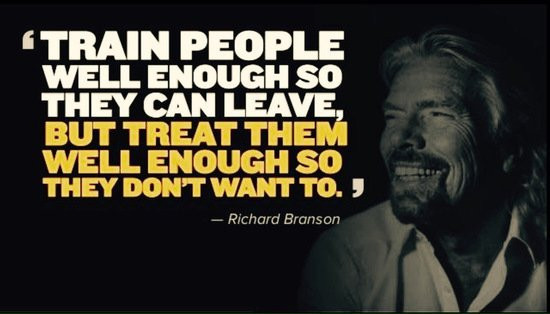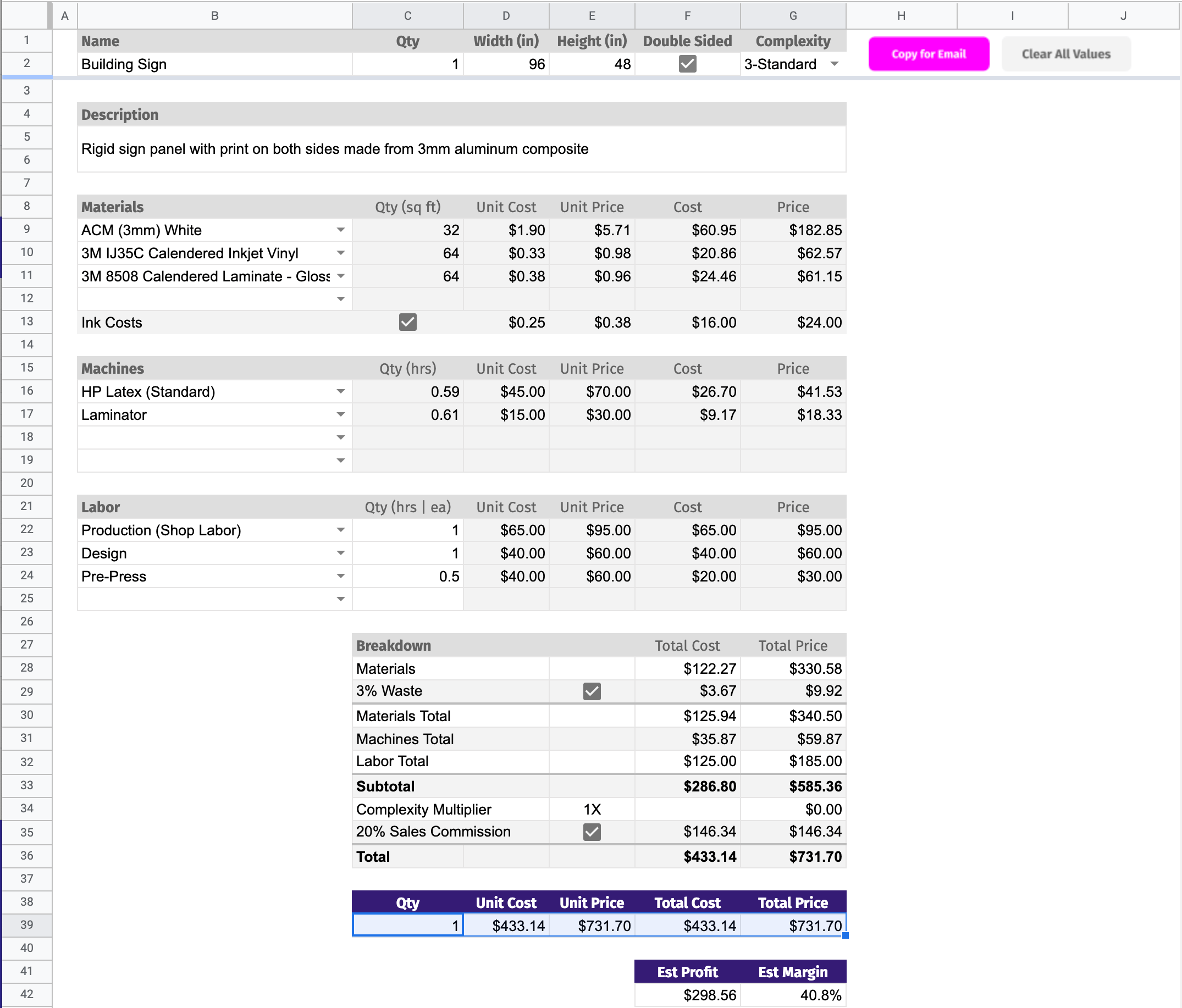A big thanks to @Dawn Petek for the help on this one.
1) Invest In Training
No one likes to suck at their job. But people don’t know what they don’t know.
If your production manager doesn’t know how to read a P&L statement or understand the shop hourly rate, how would they start thinking like an owner?
If you want truly effective employees, it’s up to you to invest in training and development.
This industry is competitive. And sometimes early employees go on to setup their own shop — sometimes even right down the street.
It’s easy to think that by cross training employees you’ll end up with yet another competitor in a year or two. But if you invest the time (and money should come second) to train employees, they’ll feel more valued and secure. Invest in that relationship and they’ll reward you with hard work and loyalty.
Let’s end this idea with a great quote from Sir Richard Branson…

2) Take a Hard Look at Yourself
Yes, this is about making your employees more effective, but it could very well be you that’s holding them back.
It’s been said that people don’t leave bad jobs, they leave bad bosses.
Do you do any of the following?
Consistently step back in on running the press, the printer, the router because “this job is too important” or “nobody else can possibly run this job like me”.
Forget to set clear expectations of what is to be done, who will do it, and when it needs to be done by.
Say you’re going to do something and forget to followup because everything on your plate.
Often skip a few steps in the processes you ask your team to follow or sometimes ignore the process altogether.
No one is more invested in your business than you are. That will never change. But it’s vital to remember that you are not your business. They are two separate objects.
When you separate yourself from those strong “this is my baby” emotions, it’s a lot easier to see ways your own behavior affects your employee’s effectiveness.
3) Conduct Better Meetings
I think lawyers and the IRS are the only things that people might despise more than unproductive, frustrating meetings.
Team Meetings
When your employees speak to their friends and family, how would they describe your team meetings?
Communication is obviously an important factor of employee effectiveness. Team meetings are a great way to communicate what we’re doing, why’re we doing it, and when it needs to be done by — to the entire team.
But whether it’s a daily production meeting or a weekly sales meeting:
Keep meetings short as possible
Start on time
Develop a clear agenda
Stick to the agenda
Finish on time
Here’s a great podcast on effective meetings from Manager Tools.
One-on-Ones
With most shops I visit or shop owners I talk to, one-on-ones are drastically under utilized.
I completely understand why they don’t get done. “We’ve got 1500 shirts to print today” or “that would take too much time”. But doing one on ones with your team every week will lead to more effective employees.
The purpose is to build a relationship with each team member.
To be truly effective, employees need feedback on how well they’re doing and what they need to improve upon. The faster the feedback loop, the faster the improvement.
Far too often, important feedback about performance is only delivered in annual or quarterly reviews.
Weekly one-on-ones provide a time and format to deliver important feedback that will improve performance. And your employees will feel more valued because you’re taking the time to focus of them.
If you’re not sure where to start, here’s another great podcast from Manager Tools on one-on-ones.
4) Create and PROTECT your culture
You have your own personality. So does your business. Your company culture speaks to your team.
“People who work here do things like this”.
So what does your shop’s personality say to your team?
Culture can be more important than process. That’s because your processes are influenced by your culture. And your processes guide your team.
Employees who identify and “buy in” to your culture will easily be more effective than those who don’t feel your values match theirs.
Once you’ve established the right culture, you have to defend it at all times.
If you give the OK to ship that order even thought it’s not up to your normal standard “just this once, because we don’t have time to reprint it”…
Then someday soon you’ll start seeing orders come back for larger mistakes “that slipped by” an employee.
BUT
If you take the time to really listen your customer service rep’s ideas and add their ideas to your team’s process if they make sense…
Then pretty soon you’ll start hearing a lot of other valuable ideas you weren’t getting before. Ideas that just might have a huge impact on your business.
5) Praise in public, coach in private
One of the biggest reasons employees leave jobs or don’t give their best is not the one you think it is.
Fair pay is important, but not feeling valued can cause a team member to sprint for the door.
If you can’t remember the last time you gave someone positive feedback, then you’re not doing it enough.
Someone give you a valuable idea? Give them credit for it at your next meeting in front of the whole team. It might seem very small to you, but kind words make all the difference to your team.
On the flip side, if someone screws up on a job, don’t give your negative feedback in public.
It might seem like a great chance to teach an important lesson to everyone on the team, but resist that urge.
Remember that no one likes to feel embarrassed. By calling out an employee in front of the team, you put them on the defensive. That’s no good if you want to change a certain behavior.
It’s best to coach them one-on-one about the mistake and how to correct it moving forward.

